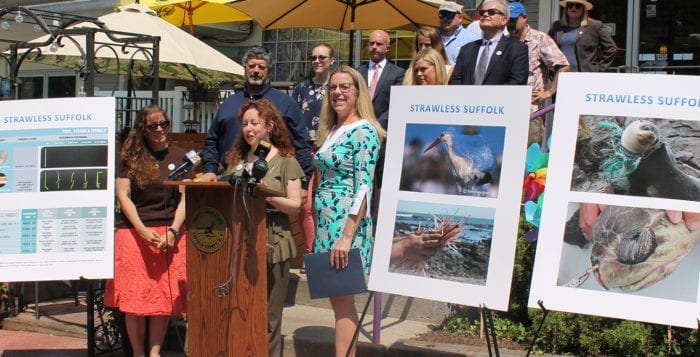By Amanda Perelli
A Suffolk County legislator is asking residents to go strawless this summer, along with local participating restaurants pledging to keep from giving out plastic straws.
Legislator Kara Hahn (D-Setauket) and members of the Suffolk County Plastic Reduction Task Force, have launched a countywide initiative to reduce single-use plastic straws, named Strawless Suffolk.
The goal is to have 100 seaside restaurants in Bellport, Greenport, Huntington, Northport, Patchogue and Port Jefferson Village take a pledge to stop using plastic straws by Labor Day, according to Hahn.
The initiative’s kickoff announcement was held July 2 at The Purple Elephant in Northport. It is one of 31 restaurants and two schools that have already taken the pledge.
The restaurants that pledge will be provided with a blue turtle decal that states “Strawless Summer 2018 Participant.”
“We can get rid of that throw away culture that we have and move toward reusing, rather than just trying to recycle.”
— Kaitlin Willig
“If you see the sticker, go back to those restaurants because they are doing the right thing,” Hahn said.
To be eligible, restaurants can participate in three ways: Stop using straws completely, provide biodegradable straws made with paper or bamboo upon request and/or provide reusable straws made of stainless steel or glass.
“The task force was created in order to reduce the single-use plastics,” said Kaitlin Willig, Stony Brook
University School of Marine and Atmospheric Sciences and vice chair of Suffolk County Plastic Reduction Task Force. “I think we are trying to go about it in a way that educates people, so they make the choice themselves. We can get rid of that throw away culture that we have and move toward reusing, rather than just trying to recycle. We are trying to go through education and make smarter choices.”
Hahn said she’s been participating in beach cleanups for a long time and is always struck with how many straws she comes across.
“We’d go to a restaurant and it would make me so angry when they just put [a straw] in your drink without even saying anything,” Hahn said. “I mean it’s really just a waste. I can’t even say no at this point because it’s too late. If they put it down and it’s wrapped, I’ll just give it back.”
Hahn added that leaving the unused wrapped straw on the table is not enough. She worked in a restaurant and said it is common an unopened straw would be thrown out anyway. She directed those interested in getting involved to take their own pledge with the Skip the Straw campaign, a similar initiative tailored
to get individuals involved by Ocean Conservancy, a nonprofit dedicated to protecting ocean health.
“I think individuals should think about trying to do it themselves,” Hahn said. “You know first and foremost you can be responsible for what you do as an individual and then you can also tell the restaurants you frequent. You can tell them they don’t need to, and they’ll save money if they don’t automatically give out straws. If they make it by request, they can save a lot and then if they do choose to provide some upon
request, make it paper.”
Nearly 90 percent of all marine debris is made of plastic, including plastic straws. Every day Americans discard half a billion plastic straws, many of which find their way into oceans and inland waterways,
according to the press release.





